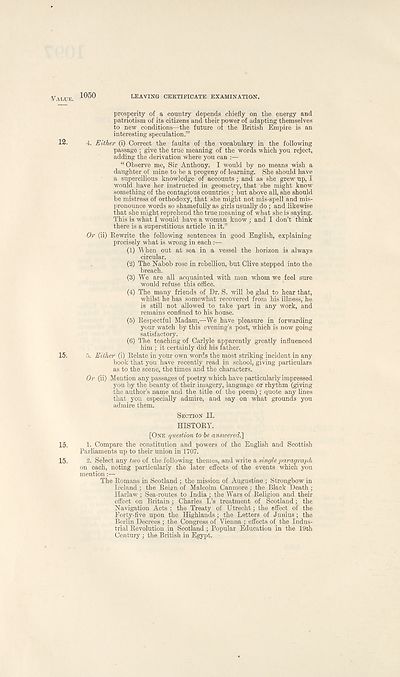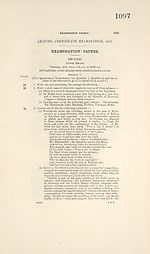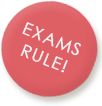Download files
Complete book:
Individual page:
Thumbnail gallery: Grid view | List view

LEAVING CERTIFICATE EXAMINATION.
Value.
12.
15.
15.
15.
1050
prosperity of a country depends chiefly on the energy and
patriotism of its citizens and their power of adapting themselves
to new conditions—the future of the British Empire is an
interesting speculation.’”
4. Either (i) Correct the faults of the vocabulary in the following
passage ; give the true meaning of the words which you reject,
adding the derivation where you can :—
“Observe me, Sir Anthony. I would by no means wish a
daughter of mine to be a progeny of learning. She should have
a supercilious knowledge of accounts; and as she grew up, I
would have her instructed in geometry, that she might know
something of the contagious countries ; but above all, she should
be mistress of orthodoxy, that she might not mis-spell and mis¬
pronounce words so shamefully as girls usually do ; and likewise
that she might reprehend the true meaning of what she is saying.
This is what I would have a woman know ; and I don’t think
there is a superstitious article in it.”
Or (ii) Rewrite the following sentences in good English, explaining
precisely what is wrong in each :—
(1) W hen out at sea in a vessel the horizon is always
circular.
(2) The Nabob rose in rebellion, but Clive stepped into the
breach.
(3) We are all acquainted with men whom we feel sure
would refuse this office.
(4) The many friends of Dr. S. will be glad to hear that,
whilst he has somewhat recovered from his illness, he
is still not allowed to take part in any work, and
remains confined to his house.
(5) Respectful Madam,—We have pleasure in forwarding
your watch by this evening’s post, which is now going
satisfactory.
(6) The teaching of Carlyle apparently greatly influenced
him ; it certainly did his father.
5. Either (i) Relate in your own words the most striking incident in any
book that you have recently read in school, giving particulars
as to the scene, the times and the characters.
Or (ii) Mention any passages of poetry which have particularly impressed
you by the beauty of their imagery, language or rhythm (giving
the author’s name and the title of the poem) ; quote any lines
that you especially admire, and say on what grounds you
admire them.
Section II.
HISTORY.
[One question to be ansiveredi]
1. Compare the constitution and powers of the English and Scottish
Parliaments up to their union in 1707.
2. Select any two of the following themes, and write a single paragraph
on each, noting particularly the later effects of the events which you
mention :—
The Romans in Scotland ; the mission of Augustine ; Strongbow in
Ireland ; the Reign of Malcolm Canmore ; the Black Death;
Harlaw; Sea-routes to India • the Wars of Religion and their
effect on Britain; Charles I.’s treatment of Scotland; the
Navigation Acts ; the Treaty of Utrecht; the effect of the
Forty-five upon the Highlands ; the Letters of Junius ; the
Berlin Decrees ; the Congress of Vienna ; effects of the Indus¬
trial Revolution in Scotland ; Popular Education in the 19th
Century ; the British in Egypt.
Value.
12.
15.
15.
15.
1050
prosperity of a country depends chiefly on the energy and
patriotism of its citizens and their power of adapting themselves
to new conditions—the future of the British Empire is an
interesting speculation.’”
4. Either (i) Correct the faults of the vocabulary in the following
passage ; give the true meaning of the words which you reject,
adding the derivation where you can :—
“Observe me, Sir Anthony. I would by no means wish a
daughter of mine to be a progeny of learning. She should have
a supercilious knowledge of accounts; and as she grew up, I
would have her instructed in geometry, that she might know
something of the contagious countries ; but above all, she should
be mistress of orthodoxy, that she might not mis-spell and mis¬
pronounce words so shamefully as girls usually do ; and likewise
that she might reprehend the true meaning of what she is saying.
This is what I would have a woman know ; and I don’t think
there is a superstitious article in it.”
Or (ii) Rewrite the following sentences in good English, explaining
precisely what is wrong in each :—
(1) W hen out at sea in a vessel the horizon is always
circular.
(2) The Nabob rose in rebellion, but Clive stepped into the
breach.
(3) We are all acquainted with men whom we feel sure
would refuse this office.
(4) The many friends of Dr. S. will be glad to hear that,
whilst he has somewhat recovered from his illness, he
is still not allowed to take part in any work, and
remains confined to his house.
(5) Respectful Madam,—We have pleasure in forwarding
your watch by this evening’s post, which is now going
satisfactory.
(6) The teaching of Carlyle apparently greatly influenced
him ; it certainly did his father.
5. Either (i) Relate in your own words the most striking incident in any
book that you have recently read in school, giving particulars
as to the scene, the times and the characters.
Or (ii) Mention any passages of poetry which have particularly impressed
you by the beauty of their imagery, language or rhythm (giving
the author’s name and the title of the poem) ; quote any lines
that you especially admire, and say on what grounds you
admire them.
Section II.
HISTORY.
[One question to be ansiveredi]
1. Compare the constitution and powers of the English and Scottish
Parliaments up to their union in 1707.
2. Select any two of the following themes, and write a single paragraph
on each, noting particularly the later effects of the events which you
mention :—
The Romans in Scotland ; the mission of Augustine ; Strongbow in
Ireland ; the Reign of Malcolm Canmore ; the Black Death;
Harlaw; Sea-routes to India • the Wars of Religion and their
effect on Britain; Charles I.’s treatment of Scotland; the
Navigation Acts ; the Treaty of Utrecht; the effect of the
Forty-five upon the Highlands ; the Letters of Junius ; the
Berlin Decrees ; the Congress of Vienna ; effects of the Indus¬
trial Revolution in Scotland ; Popular Education in the 19th
Century ; the British in Egypt.
Set display mode to:
![]() Universal Viewer |
Universal Viewer | ![]() Mirador |
Large image | Transcription
Mirador |
Large image | Transcription
Images and transcriptions on this page, including medium image downloads, may be used under the Creative Commons Attribution 4.0 International Licence unless otherwise stated. ![]()
| Scottish school exams and circulars > Leaving Certificate Examination > (2) |
|---|
| Permanent URL | https://digital.nls.uk/144134572 |
|---|
| Shelfmark | P.P. 1908 XXVIII |
|---|---|
| Attribution and copyright: |
|
| Description | Examination papers for the School Leaving Certificate 1888-1961 and the Scottish Certificate of Education 1962-1963. Produced by the Scotch (later 'Scottish') Education Department, these exam papers show how education developed in Scotland over this period, with a growing choice of subjects. Comparing them with current exam papers, there are obvious differences in the content and standards of the questions, and also in the layout and use of language |
|---|---|
| Additional NLS resources: |
|



